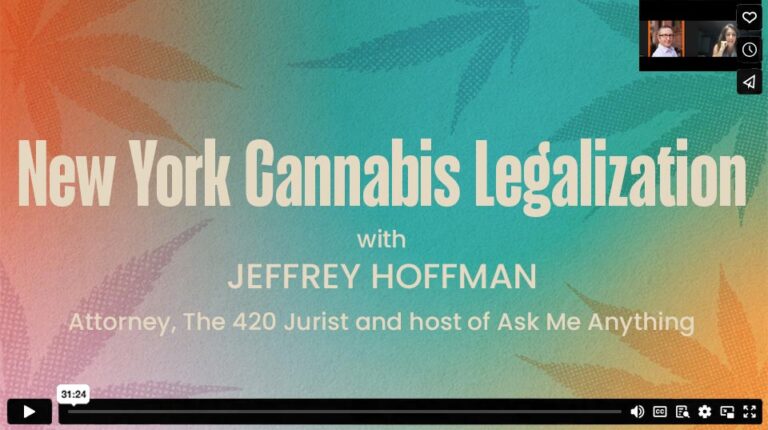Jen Lamboy, Director of Strategy, Hybrid Marketing Co.
So right now New York is a really fascinating state to watch if you’re in cannabis. Even if you’re not in cannabis, New York is always an interesting state to watch. So within the space we’re seeing and we have seen for decades now, illicit shops, now we’re starting to see a little bit more on some raids. There’s talk of farmers markets to move some of the first harvest that New York is seeing. Whether or not that’s actually going to take place, I guess we’ll find out here, but I invited New York City attorney Jeffrey Hoffman to join me today on the podcast. He is a large voice within the cannabis space in New York. If it touches cannabis, Jeffrey’s firm deals with it. He’s also known as the 420 Jurist. He’s also got a show on LinkedIn called Ask Me Anything where he covers cannabis legalization in New York. And just to give you a little bit more information about the work that he and his firm are doing, they’ve got a particular focus on cannabis prisoners and helping them with expungement as well as social and economic equity cannabis license applicants. So I’m so pleased, Jeffrey, that you are joining us. I know you’re a busy man. There’s a lot of work to be done in New York. So welcome. Thank you. Thank you.
Jeffrey Hoffman, Attorney, The 420Jurist and host of Ask Me Anything
Thank you for having me.
Jen Lamboy, Director of Strategy, Hybrid Marketing Co.
You bet. So about your large voice in New York, give us that. Give us an idea of the work you’re doing right now, who you’re repping in New York and kind of, yeah, those two things. I think if we start there, we’ll give the audience a good taste of who you are.
Jeffrey Hoffman, Attorney, The 420Jurist and host of Ask Me Anything
Sure. So on the business side, we’re very actively spooling up the regulated industry here in New York. Last year, the state started with conditional cultivators and conditional processors. They quickly moved on to the first retail license which is called CAURD, that’s “conditional adult use retail dispensary.” They’ve so far given out 251 of those licenses. I’d say about a dozen plus of the stores have actually opened. A bunch more will be opening over the rest of this year. And then finally as we get into the fall, it looks like the application will open for what we are calling the standard licenses, that’s basically everybody else, and we’ll include the social and economic equity applicants. That’s when they will start coming into the picture.
Jen Lamboy, Director of Strategy, Hybrid Marketing Co.
So as far as the legal landscape we’re watching, you know we’re watching from Colorado, there’s a lot of states who are looking to New York, you’ve got some unique challenges. How did New York land, where it is in terms of the legal landscape around cannabis?
Jeffrey Hoffman, Attorney, The 420Jurist and host of Ask Me Anything
So I’ll give you a very quick story of the Full Monty here. So everybody thinks New York is this liberal state and they think this because of downstate, because of New York City. But really if you look at the rest of the state, it’s actually fairly conservative outside of the the downtown cores of, you know, Syracuse or Albany or Buffalo upstate, the state is, is very conservative frankly. And so, frankly, for most of my lifetime, the state Senate was actually controlled by the Republican Party. And as everyone knows, there’s only one party in this country that moves cannabis legislation, and New York is not one of the states where the citizenry can initiate referenda. So the only way legalization could ever happen was through the legislature. And again, for most of my lifetime, the Senate in the legislature was controlled by the Republican Party, which was never going to move cannabis legalization. We did get medical. Finally, in the mid 2010s, and you may recall, we had a wave election across the country in 2018 after Trump was elected in 2016, there was a pretty Big Blue wave in 2018. And here in New York, the Democratic Party, and in fact the very liberal wing of the Democratic Party, took over both houses in the legislature. The Assembly and the Senate and also the governor at the time was Governor Cuomo and he was no big fan of cannabis. But in the 2018 election he was primaried by Cynthia Nixon of Sex and the City fame and she was a really good candidate and she really pushed him left on a lot of issues, one of them being cannabis. Now he pushed a more business-oriented legalization bill and the legislature which was much more liberal than him pushed a much more social equity-oriented bill and they fought about that for three years. So like we had that election in 2018, Cuomo moved left but he and the legislature were never able to come to an agreement about what the law would look like. And then you may recall at the beginning of 2021, Cuomo was in the depths of his “me too” problems which would eventually force him from office. And so at that point, the legislature said, well, we’re just going to go with our bill, and if the governor feels like vetoing it, good luck to him. So they passed the more social equity-focused bill and I guess Cuomo just decided in the depths of his political problems that he didn’t really have the political capital to veto it. So he didn’t. So the bill became law. The more equity focused-bill did become law. However, in his last, you know, spiteful moment against all of this, the first thing that had to happen coming out of the law being passed was that the governor would appoint the members of the Cannabis Control Board and Cuomo simply never did that. And so from March of 2021 until September of 2021, we had no board in New York. So there was no way for anything to proceed. And then it was in September I believe when Cuomo was finally forced from office and one of the very first things the new governor Governor Hochul did when she came into office was appoint the board and off we go with finally starting the industry. So it took much longer for cannabis to get legalized in New York than anyone expected. And then we had all these other hiccups because of the battles between the legislature and the governor. But so finally then late 2021 we get things pulled up and you know there’s been some unforced errors and some lawsuits and all kinds of things. That’s what pretty much happens in every state. But we are finally here in mid 2023 at the point where you know there are stores opening and the main licensing is going to start probably here in the fall. But you know, a bit of a tortured history of how we got to this point, right?
Jen Lamboy, Director of Strategy, Hybrid Marketing Co.
And unique. I feel like each state has its own tortured and unique history.
Jeffrey Hoffman, Attorney, The 420Jurist and host of Ask Me Anything
That’s it.
Jen Lamboy, Director of Strategy, Hybrid Marketing Co.
With cannabis, I was in New York City not too long ago for MJ Unpacked, and I visit there often. I also poke my head into a lot of the bodegas and illicit shops and I’m fascinated, especially coming from Colorado where there’s really not a lot of interaction, at least in the last, well, I’ll say when I was last there a couple months ago as far as law enforcement really kind of stepping in or stepping on the toes of of the illicit shops. Why, why is that? Why are they so prevalent and able to operate with such freedom I guess?
Jeffrey Hoffman, Attorney, The 420Jurist and host of Ask Me Anything
They’re finally getting serious about it. The governor, at a press conference earlier this week, finally used the words “padlocks on doors” and “go after landlords.” So they’re finally getting serious about it. They’ve taken their time to get there, but they finally are getting serious about it. So look, you know, everybody comes to me and is like, aren’t you excited that there’s finally going to be a cannabis industry in New York? And I’ve got to, you know, take them aside, chuckle a little bit, and I’ve got to take them aside. I say, look, there’s been a billion dollar cannabis industry in New York and especially here in New York City as long as I’ve been alive, right? And while the bodegas and whatnot, the illicit storefronts are not legacy. My line is “legacy don’t want you to know what legacy is doing.” Legacy is the guy that you had his pager number and back in the day, since you didn’t want them to be able to trace it to your phone number. You would go out to the pay phone in front of your building. You would call the pager number and then you know an hour later, two hours later, 12 hours later a dude would show up. Maybe a gal, but usually it was a dude and and sell you cannabis. So that has existed here forever, You know as long as people have been buying and smoking cannabis, and so that industry has just existed. So not that it didn’t exist in other places, but it really existed here in New York. And then you have to remember that the municipality or the jurisdiction in the United States or frankly in the world that was the absolute worst about anti-cannabis enforcement and really destroying the economic opportunities for black and brown folks was New York City, the worst, right? We arrested and convicted and incarcerated more people for cannabis than anybody else. It was just ridiculous. And so once we legalized, there was just going to be a real movement where they did not want to see black and brown folks in handcuffs being marched out of illicit storefronts. So I think initially there was a real reticence to do that and I think the law enforcement folks did not, were not clear about what their power was to padlock doors and go after landlords, right. And so, you know, there were bills about it last year that passed the state Senate but never passed the assembly. And I guess back then the Assembly didn’t think they had a problem. I think they get it now. And that’s why they gave law enforcement a bunch more authority when they passed the budget this year. Now we don’t want to see a return to arrests and convictions and incarcerations of the low level folks that are working in these stores. It’s not. Yes, they should know better, but they’re not the ones really making the money here. We want to padlock the stores and we want to go after the landlords, right? How we’ve gotten to the point where landlords don’t have to do due diligence about whomever they’re leasing their storefronts to, where they can just lease to whomever they want, regardless of whether or not the lessee is going to engage in illegal activity. I just, I don’t understand why the landlords think that’s OK and I don’t know what planet they’re living on, so I really would like to get draconian on them. I do think the state is going to pick that up, like tomorrow, we’re going to come and inspect you. We find cannabis, It’s $100,000 fine to the landlord. We’ll come back in a week or two. If it’s still there, it’s a $500,000 fine. And we come back a week or two later. And if it’s still there, we take your building, right? The first building you take, that will be the end of the problem. No other landlord is going to risk having their building taken, right? So. That’s the way you solve this. If you really want to solve it. The legislature has already now vested law enforcement and the office of Cannabis Management with the power to do this. So go forth and do it. I don’t even care about the storefronts. Don’t even worry about them. Go to the landlords, fine them six figures, and then take a building and see how quickly this problem solves itself
Jen Lamboy, Director of Strategy, Hybrid Marketing Co.
And you’ve been talking about padlocks on doors for a while. So why do you think this hasn’t happened? I mean, you kind of explained a little bit, sort of the history while we got there. Are they still formulating, you know, regulations?
Jeffrey Hoffman, Attorney, The 420Jurist and host of Ask Me Anything
No, no, no. The rules are all there. No, it’s all there now. It’s just that they move slow. Government is not business, right? And government’s never going to do anything as quickly or as smartly or as competently as you want them to. That’s just a fact, right? And so we just have to recognize that this is why they should have started last summer, right? This is not a new problem. We knew this was a problem last summer, right? So it took them a year to get to where they should have been a year ago, right? But they’re finally here. And so let’s do it right. Like, let’s really padlock some doors, Let’s really fine some landlords, and let’s take a building, right? Like the first I’m serious, the first building you take. And this problem will solve itself very, very quickly, I assure you of that 100%
Jen Lamboy, Director of Strategy, Hybrid Marketing Co.
I bet. I bet. So what is the feel of those who are in the illicit shops, those who are coming from legacy and those who are applying for or waiting to hear from the state if they have a license, what does that conversation look like? How do those folks feel about each other in the space?
Jeffrey Hoffman, Attorney, The 420Jurist and host of Ask Me Anything
I’m not quite sure I understand your question fully, but I’ll try to give it a go. So like, there are a lot of legacy players that stopped being legacy to have this opportunity, right? I know a lot and they’ve now got licenses or now making the movement towards doing that. I think there’s a lot more work that needs to be done to convince legacy folks that this is a real opportunity and this is what they want to do. I think the state frankly needs to extend more olive branches, right? You know, one example of things, you know, going back to what I told you, there has been a cannabis industry in New York City as long as I’ve been alive. It’s mostly a delivery industry. And if you really wanted to bring legacy over, I think you could have done something where you said, hey, come out of the shadows, come talk to us. We want you to be the infrastructure for people to get their cannabis here in the city. And you got to get licensed, You got to pay your taxes. But let’s do an olive branch to you. You’re already doing this. You already have the infrastructure to make this happen. Let’s just change who you’re getting the cannabis from. Let’s change it from illegal illicit players to licensed cultivators. And then we’ll work with you to help you to be licensees to do the last mile. I think that was a tremendous missed opportunity to really give what is the largest component of legacy here in New York an olive branch and a vehicle to come into the licensed market. And the opportunity’s not gone away, but it’s not clear to me that the state is going to take advantage of it, right? And there’s two things you have to do in the United States not to be a failed cannabis state, and California is the poster child for doing none of them, and we may end up in the same position in New York, but the two things you gotta do is you’ve got to have a very, very reasonable tax regime. You know in fact my proposal is we ought to have a tax holiday until the market is well established. And then the other thing you gotta do is you have to make legacy a partner not a competitor, right. California has chosen to make the legacy players competitors and as competitors, the Legacy players are eating the state’s lunch, right? I mean, the California cannabis market is, I mean, I don’t know, picture 60, 70, maybe even as much as 80%, still the illicit market. And it’s because the state did a terrible job on taxation and did a terrible job on making legacy a partner. Now New York may very well go down that same path. It’s not a foregone conclusion. I think they may be doing a little bit of a better job on, you know, trying to do a few things with legacy, but they’re not doing anywhere near enough. And I do think they’re making the same mistakes on the taxation side. The taxation regime here in New York is crazy.
Jen Lamboy, Director of Strategy, Hybrid Marketing Co.
And I think a lot of states are feeling that as well. You know as a cannabis marketing agency we get a lot of folks on our inbound who’ve secured a retail license. We talk about who are your competitors. You know just so we can get a sense of alright, who do we need to, you know, who do we need to kind of build up against or who do we need to go after? Where’s the market share. Oftentimes when we ask in states like Hawaii, we’ll say who are your competitors, the first thing they say is the black market, the legacy market and that makes it really interesting, an interesting challenge even in a medical state. You know, how do you get around that? But are you suggesting that you really have to wait on the legislation to kind of change to kind of help those folks who are in states where that is their top competitor?
Jeffrey Hoffman, Attorney, The 420Jurist and host of Ask Me Anything
So again, I’m not, I want to clarify your question just a bit. Are you saying like if you’re in a state that has any version of recreational, and medical is a different, but I think this is mainly an AU problem. We call it adult use, other states call it recreational, is the question more along the lines of how do we help them around it. If you wouldn’t mind, just unpack that for me a bit more…
Jen Lamboy, Director of Strategy, Hybrid Marketing Co.
Yeah. How do we help help them? And I’m going to expand a little bit more too on that topic of an olive branch as well. But how do we help them in your opinion?
Jeffrey Hoffman, Attorney, The 420Jurist and host of Ask Me Anything
I mean I’ll just go back to what I said, you have to bring legacy in. They’re gonna eat you. They’re gonna under price you, they’ve already got the customers, right? What competitive advantage do you think the regulated market has for them? None, unless you make one, right? So I just think you have to make it appealing to legacy, right. You know there’s a certain segment of the population that is never going to shop legacy, right. The cannabis curious are always going to want to shop in a regulated store. But the people that already have a plug, why are they going to go to the licensed market if they trust the plug, if they trust the price? You know, the main reason you may go to the regulated market right now is selection. Right, because usually a well stocked, regulated store is going to have a better selection than an illicit operator and confidence that the product is not adulterated, that it is what it says on the label, etc. If you don’t have those concerns, if you trust your plug and he’s got the selection you want, and you’re not concerned about whether or not he’s adulterated or if there’s a problem with the product, what is your interest in shopping at a license store, right? So you’ve got to do steps to bring that in, right. And it just there are ways you, you know it’s not that 100% of the legacy operators aren’t interested. Yes, there are certainly legacy operators that are like “I’m legacy, I’m not interested in your license and go away” right? But there’s plenty of legacy players that are, and frankly, for my money, I think it’s the smarter ones that are because they see the writing on the wall, right? One day this is all going to be controlled by Altria or one of the other, you know, it’s the way alcohol went. It’s the way this is eventually going to go. It may not be in my lifetime. You know, I’m 53. We’ll see. It took alcohol a long time to get there. So one day that’s what it’s going to be. And if you want to be a player at that point, it’s going to behoove you to start working with the players that are going to be doing that, right? And so legacy guys are super smart. They’ve run legacy illegal businesses where they both had to run a business and be, you know, hiding themselves from the long arm of the law. They’re smart folks, right? They see what’s going on and they do want to participate in this if they can. It’s just the state has got to make it a smart, viable path for them to do so.
Jen Lamboy, Director of Strategy, Hybrid Marketing Co.
Well, I would add to that too, when you mentioned that olive branch, I’m curious to know how far the states can take it in terms of helping folks around, you know these folks coming from the legacy world or even folks who are stepping into, I’m talking specifically people of color who are stepping into a space where, and I’m only speaking from experience and and even a conversation I had this week where we had, we’ve got some folks out of Mississippi who hold a cultivation license. They’re ready to step into the space and they do not have all the tools or even the knowledge of the industry in terms of even platforms on how to move some of their product or all the basics of of even building a brand and getting in front of the folks who are going to help them reach their revenue goals. So I’m, I’m curious, you know we try to gather resources to help folks. Is there anything that you’re seeing New York in particular kind of help beyond, hey, legacy world or hey, you know, in terms of even the social equity work to really expand and help them realistically?
Jeffrey Hoffman, Attorney, The 420Jurist and host of Ask Me Anything
Oh yeah, here in New York they’re doing a mentorship program where they’re bringing legacy folks and putting them together with folks that are licensed and help them understand that they’re doing all kinds of programs with the CAURD folks to help them. I’m involved in a nonprofit where we are taking returning citizens and helping train them up to be in the cannabis industry. We literally just took a group of 25 folks to PharmaCann north of the city to tour their cultivation and processing facility. It was unbelievable. It was amazing how attuned and the questions that these legacy folks had, you know like I said returning citizens, folks were previously incarcerated, they were so interested and involved in talking with the folks running the cultivation and processing facility. I mean, it was just amazing. So I just think there are absolutely good things that we’re doing. There needs to be a heck of a lot more, right? More of these kinds of things are how we’re going to be successful, right?
Jen Lamboy, Director of Strategy, Hybrid Marketing Co.
Sure. Are you seeing any other states who are a model for this, or would you say New York is the is model of this right now?
Jeffrey Hoffman, Attorney, The 420Jurist and host of Ask Me Anything
As far as equity, New York is going to be the model. No one else has done that right or even close.
Jen Lamboy, Director of Strategy, Hybrid Marketing Co.
Right, awesome. And it’s so interesting again, you know as I mentioned, I came from, well I don’t know if I mentioned it yet, but I came from the seed genetics world, working with some legacy….
Jeffrey Hoffman, Attorney, The 420Jurist and host of Ask Me Anything
Do you know, I’m just curious. Do you know Alexa Davis?
Jen Lamboy, Director of Strategy, Hybrid Marketing Co.
I do not know Alexa Davis…
Jeffrey Hoffman, Attorney, The 420Jurist and host of Ask Me Anything
OK, I just asked because she’s in a similar world and she’s a client of mine. So, it’s a small world, but you don’t know her, so it’s all good. Yeah, keep going.
Jen Lamboy, Director of Strategy, Hybrid Marketing Co.
Yeah. So I I just remember when I was was first brought into the organization I was working for they were highly successful but there was no brand, there was no website, there was no no digital presence and in my mind that was my first entry into cannabis and I thought, how are you moving so much seed? Without folks really knowing about you? But at the time had no real understanding of the legacy market. And so it was, it’s just been fascinating to see how much things have changed and that was, gosh, that was 2018, how much things have changed over the last handful of years. And the years ahead of us, how do you think we’re going to move at lightning speed going forward, specifically even in New York?
Jeffrey Hoffman, Attorney, The 420Jurist and host of Ask Me Anything
I think it’s going to be fits and starts. Some things will move forward very fast. Some things will be slowed down, Some things will be driven crazy. Some very smart things will not be done. Some very stupid things will be done. It’s just going to be all over the map really.
Jen Lamboy, Director of Strategy, Hybrid Marketing Co.
Yeah, I would agree.
Jeffrey Hoffman, Attorney, The 420Jurist and host of Ask Me Anything
It just is. I mean, that’s just the reality.
Jen Lamboy, Director of Strategy, Hybrid Marketing Co.
Right. So why is it that you’re in this particular industry? I feel like it takes a certain type of person.
Jeffrey Hoffman, Attorney, The 420Jurist and host of Ask Me Anything
Yeah. So, I mean, I’ve been getting high since Reagan. The only constants in my life since then are cannabis and my mother. So it’s always been me, right? I mean, I was a stoner long time before I was an attorney. I’ve been screaming about the justice issues forever, right? It’s always boggled my mind. You know, cannabis has been part of humanity as long as there has been humanity. It’s only in my lifetime that we’ve decided to put people in jail for being close to this plant. And for my money, it’s among the dumbest things we’ve ever done to ourselves, right? Like the trillions of dollars in damage that we’ve done to our fellow citizens because we put them in jail and destroyed their families. For a plant that’s been part of humanity for as long as there’s been humanity. It’s just it’s just the dumbest thing we’ve ever done among the dumbest things we’ve ever done. And so I’ve always been pushing that. Finally New York legalized. I kind of gave you the story, you know, when Colorado legalized back in 2012 or 13, I seriously considered moving to Colorado to be part of it. I said “Nah, New York will get it together here at some point.” Took another eight years but finally they did it. And but you know my thing with that is, look we could finally now do the justice stuff that I want. So like I’ve gotten, you know, my big thing is, I helped Last Prisoner Project. I don’t know what Last Prisoner Project is, but one of the main folks they had identified as a cannabis prisoner, me and a lovely woman in New Jersey, a Kathleen Redpath-Perez, got him out of jail. And you know, I literally went to the facility the day he was getting out and I hugged him when he came out. I mean it was one of the greatest days in my life, right? And so now we’re also very active in continuing that work with other folks and expunging records. You know, New York’s cannabis law really was forward thinking about expungement but the conservative parts of the state are not doing it correctly. So we are helping them get on the right side of that. We’re suing them. We’re appealing their denials to the appellate courts here in the state and showing them the way it’s supposed to be done. And then, you know, the other part is, I can actually now pay rent and buy food doing this. It’s a real business. We’re going to license businesses and you know, it used to be that the attorneys can only advise, you know “normal businesses,” right? But now being able to be an attorney for a cannabis business is a real thing. So it’s mind boggling to me, but I can actually pay rent and buy food doing this, right? So I’m super excited about that. It’s funny, you know, one of my goals. I grew up a number of years in a small town in North Carolina. And when you’re in towns like that, even in big towns, but generally in smaller towns, everybody knows, if you get a speeding ticket, whose the lawyer you go to, right? Everybody knows if you want to get a liquor license,, you know, Tom Smith, He’s the guy that gets everybody their liquor license. And so even though, you know, I had always been after the justice issues and I was always going to do as much as I could with that, but it was just so exciting that now we could actually make a living being a cannabis attorney. And kind of my goal with that was to be that guy, the guy that here in New York City people would say, well, who’s the cannabis guy? Who’s the guy that we want to go to when we want to know about cannabis or get a cannabis license? And I’m just very fortunate, you know, even though we’re still in the early days that, you know, my name tends to get bantered about in those circles. So I’m very lucky. I’m very blessed. I mean it has been a lot of hard work, but it does take a lot of work and a lot of luck, let me assure you. And I’m just very lucky that I’ve been able to, you know, be in that discussion. So I’m just, I’m blessed.
Jen Lamboy, Director of Strategy, Hybrid Marketing Co.
Well, we’re, you know as an industry we’re also blessed that there’s a voice like yours who is pushing so hard to make things, well, can I say to make things right, to make things better, to make things viable, to kind of grow that market not only in New York, but to be the model for the rest of the States and even the rest of the world as this industry continues to evolve. And, you know, sometimes the words that come out are “stupid” or “slow” or “challenging” or “volatile,” but you know, I think that’s when I asked you, you know, “why are you in it?” I think what’s nice about the cannabis industry is it holds space for folks who have passions in all areas. So specific to the plant, maybe even specific to legal, specific to the environment, telling the story of it. You know, the organization I worked for first was a very farmer first organization. Snd so cannabis, what it holds for folks is a lot of different flavors. You can jump into it and there’s the passion for, of course for the plant, but also for a lot of the values that we hold as individuals and as organizations, you can find that in this space. I guess I’ll also say it takes endurance and patience and the value of understanding how to network and communicate with folks. You’re one of those folks. If you don’t already know listeners, if you don’t already know Jeffrey Hoffman, please find him on LinkedIn. His website is 420jurist.com. Again, like I mentioned, he’s got a show on LinkedIn called Ask Me Anything. It’s weekly on Wednesdays, like I mentioned, at 4:20PM Eastern Time. I want to thank you so much, Jeffrey, for joining us. I want to also thank you for your work not only in New York, but like I said, what you’re doing and showing us that, you know, here’s a way that it can be done. Here’s how things can actually move in a positive direction, even though New York is quite interesting to watch.
Jeffrey Hoffman, Attorney, The 420Jurist and host of Ask Me Anything
Rock’n’roll. Thank you for having me.
Jen Lamboy, Director of Strategy, Hybrid Marketing Co.
Rock’n’roll. Thanks, Jeffrey.









